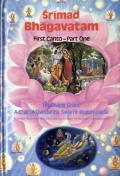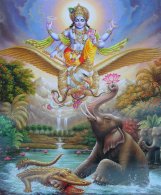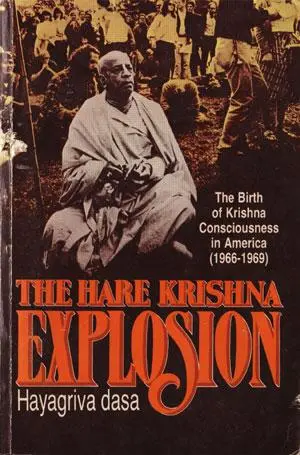This morning I was reading from the 3rd Canto of the Srimad-Bhagavatam about Vidura and the beginning of his journey to the great places of pilgrimage. The following is excerpted from some of my reading.
He began to travel alone, thinking only of Kṛṣṇa, through various holy places like Ayodhyā, Dvārakā and Mathurā. He traveled where the air, hill, orchard, river and lake are all pure and sinless and where the forms of the Unlimited decorate the temples. Thus he performed the pilgrim’s progress. (SB 3.1.18)
…Places of pilgrimages are meant for eradicating the sins of the pilgrims, and they are distributed all over the universe just to give facility to all concerned for attaining pure existence and God realization. One should not be satisfied, however, merely by visiting the places of pilgrimage and performing one’s prescribed duties; he should be eager to meet the great souls who are already there, engaged in the service of the Lord. In each and every place of pilgrimage, the Lord is present in His various transcendental forms.
…The first and foremost duty of a pilgrim is to satisfy the Supreme Lord Hari. While traveling as a pilgrim, one should not be worried about pleasing society. There is no need to depend on social formalities or occupation or dress. One should remain always absorbed in the function of pleasing the Lord. Thus sanctified by thought and action, one is able to realize the Supreme Lord by the process of a pilgrim’s journey.
Srimad-Bhagavatam
By His Divine Grace A. C. Bhaktivedanta Swami Prabhupada
Cant 3, Chapter 1, Text 17-19
TEXT 17
sa nirgataḥ kaurava-puṇya-labdho
gajāhvayāt tīrtha-padaḥ padāni
anvākramat puṇya-cikīrṣayorvyām
adhiṣṭhito yāni sahasra-mūrtiḥ
saḥ—he (Vidura); nirgataḥ—after having quit; kaurava—the Kuru dynasty; puṇya—piety; labdhaḥ—so achieved; gaja-āhvayāt—from Hastināpura; tīrtha-padaḥ—of the Supreme Lord; padāni—pilgrimages; anvākramat—took shelter; puṇya—piety; cikīrṣayā—desiring so; urvyām—of high grade; adhiṣṭhitaḥ—situated; yāni—all those; sahasra—thousands; mūrtiḥ—forms.
TRANSLATION
By his piety, Vidura achieved the advantages of the pious Kauravas. After leaving Hastināpura, he took shelter of many places of pilgrimages, which are the Lord’s lotus feet. With a desire to gain a high order of pious life, he traveled to holy places where thousands of transcendental forms of the Lord are situated.
PURPORT
Vidura was undoubtedly a highly elevated and pious soul, otherwise he would not have taken his birth in the Kaurava family. To have high parentage, to possess wealth, to be highly learned and to have great personal beauty are all due to past pious acts. But such pious possessions are not sufficient for obtaining the grace of the Lord and being engaged in His transcendental loving service. Vidura considered himself less pious, and therefore he decided to travel to all the great places of pilgrimage in the world in order to achieve greater piety and advance nearer to the Lord. At that time, Lord Kṛṣṇa was personally present in the world, and Vidura could have at once approached Him directly, but he did not do so because he was not sufficiently freed from sin. One cannot be one hundred percent devoted to the Lord unless and until he is completely free from all effects of sin. Vidura was conscious that by the association of the diplomatic Dhṛtarāṣṭra and Duryodhana he had lost his piety and was therefore not fit to associate at once with the Lord. In Bhagavad-gītā (7.28) this is confirmed in the following verse:
yeṣāṁ tv anta-gataṁ pāpaṁ
janānāṁ puṇya-karmaṇām
te dvandva-moha-nirmuktā
bhajante māṁ dṛḍha-vratāḥ
Persons who are sinful asuras like Kaṁsa and Jarāsandha cannot think of Lord Kṛṣṇa as the Supreme Personality of Godhead, the Absolute Truth. Only those who are pure devotees, those who follow the regulative principles of religious life as prescribed in the scriptures, are able to engage themselves in karma-yoga and then jñāna-yoga and thereafter, by pure meditation, can understand pure consciousness. When God consciousness is developed, one can take advantage of the association of pure devotees. Syān mahat-sevayā viprāḥ puṇya-tīrtha-niṣevaṇāt: one is able to associate with the Lord even during the existence of this life.
Places of pilgrimages are meant for eradicating the sins of the pilgrims, and they are distributed all over the universe just to give facility to all concerned for attaining pure existence and God realization. One should not be satisfied, however, merely by visiting the places of pilgrimage and performing one’s prescribed duties; he should be eager to meet the great souls who are already there, engaged in the service of the Lord. In each and every place of pilgrimage, the Lord is present in His various transcendental forms.
These forms are called arcā-mūrtis, or forms of the Lord which can be easily appreciated by the common man. The Lord is transcendental to our mundane senses. He cannot be seen with our present eyes, nor can He be heard with our present ears. To the degree that we have entered into the service of the Lord or to the proportion to which our lives are freed from sins, we can perceive the Lord. But even though we are not free from sins, the Lord is kind enough to allow us the facility of seeing Him in His arcā-mūrtis in the temple. The Lord is all-powerful, and therefore He is able to accept our service by presentation of His arcā form. No one, therefore, should foolishly think the arcā in the temple to be an idol. Such an arcā-mūrti is not an idol but the Lord Himself, and to the proportion to which one is free from sins, he is able to know the significance of the arcā-mūrti. The guidance of a pure devotee is therefore always required.
In the land of Bhāratavarṣa there are many hundreds and thousands of places of pilgrimage distributed all over the country, and by traditional practice the common man visits such holy places during all seasons of the year. Some of the arcā representations of the Lord situated in different places of pilgrimage are mentioned herewith. The Lord is present at Mathurā (the birthplace of Lord Kṛṣṇa) as Ādi-keśava; the Lord is present at Purī (Orissa) as Lord Jagannātha (also known as Puruṣottama); He is present at Allahabad (Prayāga) as Bindu-mādhava; at Mandara Hill He is present as Madhusūdana. In the Ānandāraṇya, He is known as Vāsudeva, Padmanābha and Janārdana; at Viṣṇukāñcī, He is known as Viṣṇu; and at Māyāpura, He is known as Hari. There are millions and billions of such arcā forms of the Lord distributed all over the universe. All these arcā-mūrtis are summarized in the Caitanya-caritāmṛta in the following words:
sarvatra prakāśa tāṅra——bhakte sukha dite
jagatera adharma nāśi’ dharma sthāpite
“The Lord has so distributed Himself all over the universe just to give pleasure to the devotees, to give the common man facility to eradicate his sins, and to establish religious principles in the world.”
TEXT 18
pureṣu puṇyopavanādri-kuñjeṣv
apaṅka-toyeṣu sarit-saraḥsu
ananta-liṅgaiḥ samalaṅkṛteṣu
cacāra tīrthāyataneṣv ananyaḥ
pureṣu—holy places like Ayodhyā, Dvārakā and Mathurā; puṇya—piety; upavana—the air; adri—hill; kuñjeṣu—in the orchards; apaṅka—without sin; toyeṣu—in the water; sarit—river; saraḥsu—lakes; ananta-liṅgaiḥ—the forms of the Unlimited; samalaṅkṛteṣu—being so decorated; cacāra—executed; tīrtha—places of pilgrimage; āyataneṣu—holy lands; ananyaḥ—alone or seeing Kṛṣṇa alone.
TRANSLATION
He began to travel alone, thinking only of Kṛṣṇa, through various holy places like Ayodhyā, Dvārakā and Mathurā. He traveled where the air, hill, orchard, river and lake are all pure and sinless and where the forms of the Unlimited decorate the temples. Thus he performed the pilgrim’s progress.
PURPORT
These arcā forms of the Lord may be considered idols by the atheists, but that does not matter for persons like Vidura or His many other servants. The forms of the Lord are mentioned here as ananta-liṅga. Such forms of the Lord have unlimited potency, the same as that of the Lord Himself. There is no difference between the potencies of the arcā and those of the personal forms of the Lord. The example of the postbox and post office may be applied here. The little postboxes distributed all over the city have the same potency as the postal system in general. The duty of the post office is to carry letters from one place to another. If one puts letters in postboxes authorized by the general post office, the function of carrying letters is performed without a doubt. Similarly, the arcā-mūrti can also deliver the same unlimited potency of the Lord as when He is personally present. Vidura, therefore, could see nothing but Kṛṣṇa in the different arcā forms, and ultimately he was able to realize Kṛṣṇa alone and nothing else.
TEXT 19
gāṁ paryaṭan medhya-vivikta-vṛttiḥ
sadāpluto ’dhaḥ śayano ’vadhūtaḥ
alakṣitaḥ svair avadhūta-veṣo
vratāni cere hari-toṣaṇāni
gām—earth; paryaṭan—traversing; medhya—pure; vivikta-vṛttiḥ—independent occupation for living; sadā—always; āplutaḥ—sanctified; adhaḥ—on the earth; śayanaḥ—lying; avadhūtaḥ—without dressing (of the hair, etc.); alakṣitaḥ—without being seen; svaiḥ—alone; avadhūta-veṣaḥ—dressed like a mendicant; vratāni—vows; cere—performed; hari-toṣaṇāni—that pleased the Lord.
TRANSLATION
While so traversing the earth, he simply performed duties to please the Supreme Lord Hari. His occupation was pure and independent. He was constantly sanctified by taking his bath in holy places, although he was in the dress of a mendicant and had no hair dressing nor a bed on which to lie. Thus he was always unseen by his various relatives.
PURPORT
The first and foremost duty of a pilgrim is to satisfy the Supreme Lord Hari. While traveling as a pilgrim, one should not be worried about pleasing society. There is no need to depend on social formalities or occupation or dress. One should remain always absorbed in the function of pleasing the Lord. Thus sanctified by thought and action, one is able to realize the Supreme Lord by the process of a pilgrim’s journey.
Text pasted from Prabhupada Books














